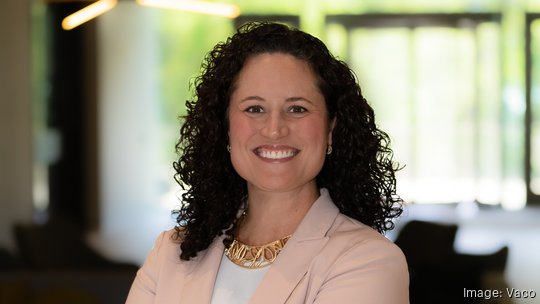
Melissa Phillippi, the founder of Durham-based WorkDove, has announced her next move. But it’s not with a startup.
Phillippi, who built HR tech startup WorkDove from the ground up and moved it to Durham from Wilmington, has landed at Vaco Holdings, a global professional services firm in Tennessee, as vice president of organizational development and talent management.
She said some people raised eyebrows to see her return to the corporate world, but she has zero regrets and is “excited,” not just about the prospects at her new employer, where she will be focused on developing strategies to enhance employee performance. She’s also excited about spending time with her family.
In an interview, she talks through the founder burnout that led her to seek out opportunities outside of the startup sector she still loves, the warning signals other CEOs should watch out for and the stigma that founders – particularly female founders – are feeling when it comes to talking about work-life balance.
Eight years into WorkDove (formerly called Performance Culture), and Phillippi was “missing things.” Her kids were getting older and Phillippi felt she was missing milestones “because I had to be the one to be available for the company, for WorkDove.”
She loved WorkDove, calling it her “baby.” But startup culture – aggressive (and, she admits partially self-induced) pressure to perform, to hit the numbers – had even her Apple Watch telling her to take a break.
Phillippi didn’t recognize it initially, but for years she had been feeling burnout, pushing to succeed, and at times it came at the expense of her own health and family, she said. It’s pressure many founders of venture-backed startups feel, she said.
“If you have investment, you have to perform… and no one is going to care as much as you, the founder,” she said. “With my particular personality and a lot of founders’ personalities, sometimes that means we start to lose our way with healthy boundaries. We start to succumb to pressures and don’t wave the white flag early enough.”
It’s something founders don’t talk enough about, she said. Particularly female founders “can have this concept of, I need to prove that I can do it.”
“You know what, I still can and I could,” she said.
But it was a choice – and one she wasn't willing to make anymore.
And she’s not alone. A recent Deloitte survey of more than 2,100 employees and C-level executives in the U.S., U.K., Canada and Australia found that nearly 70 percent of the C-Suite are “seriously considering quitting for a job that better supports their well-being.”
Phillippi said she couldn’t be more thrilled to take on the role at Vaco, a firm that’s been a WorkDove client since 2016. Vaco performs executive search functions, and when Phillippi knew she’d be stepping down, she called the company saying, “I would like to think about using your services and seeing what’s out there.”
“I never got past that,” she said. “They were like, you’ve got to talk to us.”
The job wasn’t handed to Phillippi. She faced a host of executive interviews. But it worked out – and still gives her a level of influence she’s become accustomed to. The vice president role is just two levels down from the CEO.
“I’m absolutely part of the leadership team,” she said.
And pre-WorkDove, much of Phillippi’s career had been at banks such as Bank of America.
“It’s not a shock to me to have a corporate structure,” she said. “There’s actually a lot of balance that comes from that, work life balance.”
Working for a company instead of running one means that if Phillippi wants to be “done at the end of the day, I can be done.”
“At a startup, you’re never done,” she said, adding that it’s “okay to walk away from a startup when you realize that what you’re gaining is far more than what you’re giving up.”
But even as she walks away, she’s not giving up WorkDove. At least not really. She’s still a “decent shareholder,” and plans to make her opinions known.
On what founders should pay attention to in order to stave off burnout
“When you’re starting to work more than 50 hours a week – and some people are going to read this and be laughing about that because they work way more than that,” she said. “After that 50th hour, your productivity per hour actually starts to dramatically decrease. You’re actually just wasting time.”
She said most of the time a “startup hour” is worth three to four “regular worker hours.”
“You’re aren’t just sitting down and doing one project… if you think of a car, the gear shifting you have to do in a day is so mentally and physically taxing that if you start paying attention to the hours and what those hours look like, it’s not sustainable,” she said.
When in doubt, pay attention to the Apple Watch, which was routinely telling Phillippi her heart rate was spiking during a months-long stretch that started late last year.
“Sometimes your Apple Watch will tell you you need a break too,” she said.
